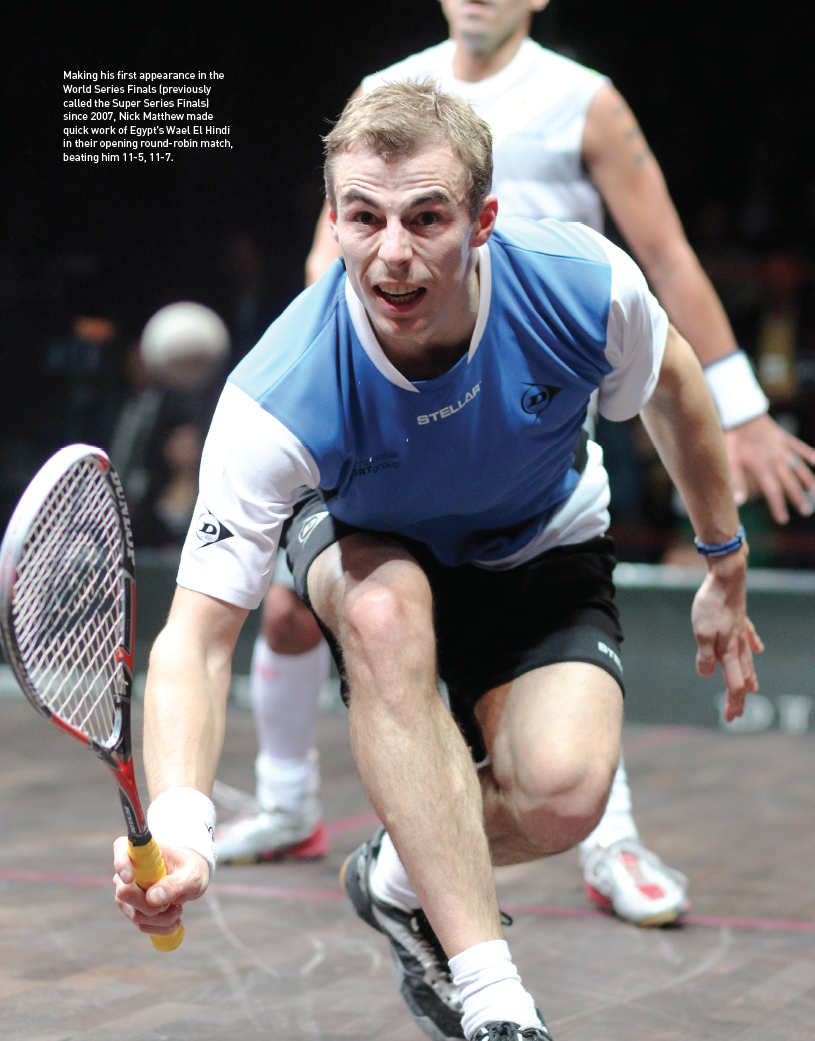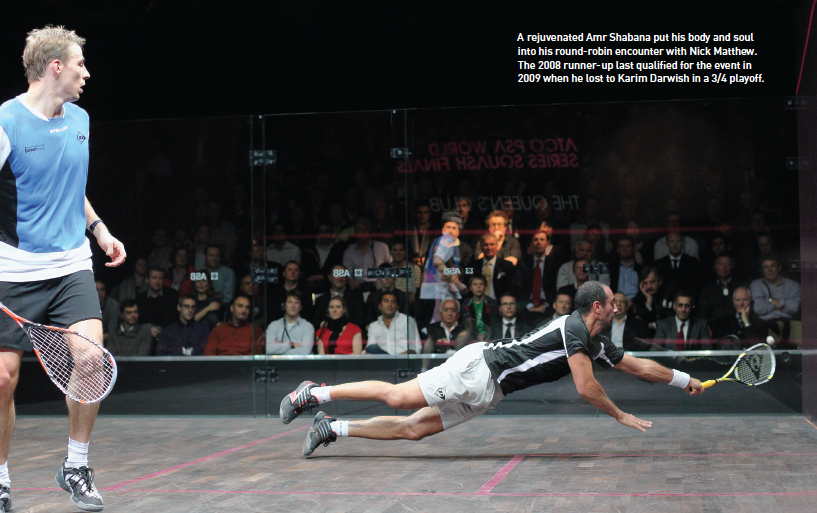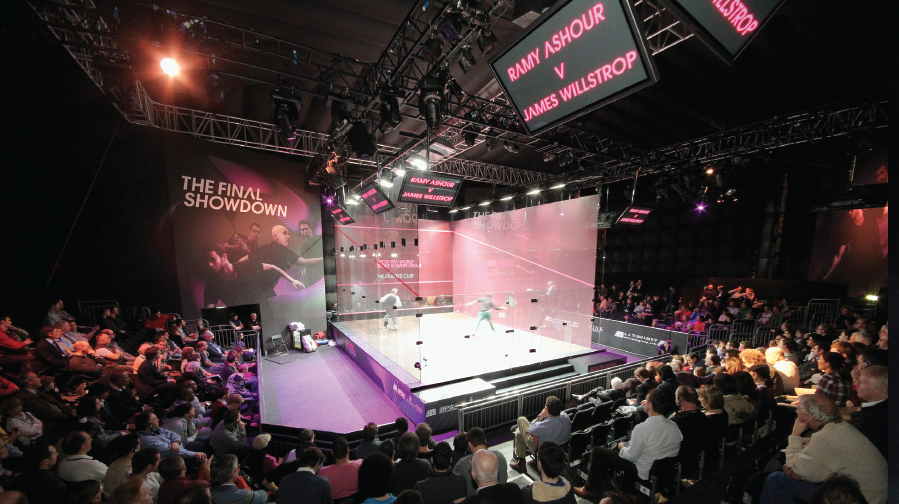
By Richard Eaton
Photos by Steve Line/SquashPics.com
The World Series finals at the Queens Club in London were billed as the “new face of squash,” which would “lead it into a new era.” Perhaps it was, and maybe it yet will. But for the moment it has become the sport’s biggest disaster.
An inflatable squash stadium—with 360-degree spectator galleries and a transparent purple court inside an enormous multi-panelled cube—stood as a synthetic giant alongside the manicured lawns and elegant windows of the 125-year-old establishment.
Few appeared to regard it as an outrage until the exclusive Victorian gravitas was disrupted by a sudden enforced evacuation. Overnight gales had punched a hole in the intruder’s roof, pulled pieces of material into unsightly hanging rags, unpicked the seams of panels, and made the structure wobble and deflate alarmingly.
Players and spectators, and even members quietly sipping their tea in the sanctity of the ancient clubhouse, were hustled with undignified haste into the damp and cold of a British winter.
They were then told to abandon the premises for the rest of the day. The tournament was over. The revolutionary monster had become a risk to life and limb.
There was no hope of Nick Matthew, the world champion from England, and Amr Shabana, the four-time former world champion from Egypt, embarking on their showdown final. An event costing about a million dollars ended in numbing anti-climax.
Briefly, though, the disaster united skeptics and supporters. Few failed to have some sympathy for Ziad Al-Turki, the PSA chairman who had put so much of his money and himself into this event, trying to change perceptions of what squash could become.
Perhaps he still will. Meanwhile there has been a prolonged head-scratching in an attempt to find another time and place where the 2010 tour’s flagship event could be completed.
Where did the blame lie? The Z-Court, as it was called, was made by ASB SquashCourts. According to sources with-in the PSA, it should have been constructed to withstand winds of 50 miles an hour.
Winds of that speed do occur in the United Kingdom with greater frequency these days. But the expected winds in London that night were apparently between 15 to 30 mph. Much may depend on how accurate this forecast was.
Legal, logistical, economic, and promotional implications may require much unravelling. Meanwhile the PSA believes there are plenty of positives in what happened.
There were sell-out crowds of 500. There was innovative lighting, natural flooring, and a vibrant aesthetic. There were exhibitions, three celebrity presenters, and an upmarket feel.
The round-robin format, with its shorter, best of three-game matches (switching back to five games for the semis and final), enabled players to qualify for the semifinals in better shape, even without a rest day.
This may have helped Shabana produce his most convincing performances for some time, and probably also Ramy Ashour, who had not recovered from the hamstring injury sustained at the World Open and perhaps should not have been competing at all.

That was certainly the view of Gregory Gaultier and Karim Darwish, who sustained similar injuries in the same event and decided they were not yet ready— even for one of the most bragged about events of the modern era.
And so the tournament began with a round-robin phase in which James Willstrop, desperate to atone for losses to Matthew in the World Open and Commonwealth Games finals, started with a 13-11, 11-6 win against Alister Walker, the New-York based Englishman substituting for Darwish.
It continued with Shabana progressing 11-8, 11-2 against Peter Barker, another Englishman debutant, and then proffering his verdict upon the scoring.
“This format is more compact and normally I would hit more winners,” Shabana commented. “By being safe you know you won’t lose the point. But I got more confident in the second game” Ashour then followed his older compatriot’s example with a 11-7, 13-11 win over Thierry Lincou, whose left knee was heavily strapped, though the Egyptian had to fight back in both games against the former World No. 1 from France.
The evening finished with Matthew, who looked in decent shape despite his concerns about his Christmas lay-off, overcoming Wael El Hindi 11-5, 11-7. “I was a little bit headless to begin with,” the world champion said. Then he added fatefully: “the venue is fantastic here and it will only get more interesting as the week goes on.”
The second day saw Shabana shade an hour-long match with Matthew which illustrated how fascinating a final between them might have been.
“Nick has raised the bar for all of us,” said Shabana after his 5-11, 11-7, 17-15 success. “It is a fine line and I had to perform my best—but at least it means I am right on track to finally win here [in the UK].”
Matthew was too methodical for him in the opener, but Shabana profited in the second from a few uncharacteristic errors from the Englishman.
The decider was excellent. Shabana was 5-7 down but advanced to two match balls at 10-8. They then traded match balls several times amidst key let decisions before Shabana sneaked it.
Over three games it proved little though, except perhaps that Shabana was fully fit for the first time in a while.
Willstrop then got past Ashour 10-12, 11-6, 11-9, commenting: “Ramy leaves you with little oxygen when he is being deceptive.” But by the semifinals that ability had deserted the young Egyptian.

The final match that second day saw Barker survive a conduct warning to beat El Hindi 13-11, 11-9 and give himself a chance of reaching the semis.
But hard as he tried, he didn’t. Barker did, however, produce some of his best squash in a 12-14, 11-3, 11-7 loss to Matthew, whom he had only ever beaten once.
He matched the world champion for extended phases of a fast-paced, long-rallied match, sometimes forcing him into errors.
But when Matthew took seven points in a row in the second game, he began to make his physical strength and mid-court dominance count.
“If you lose the first game in this format it is pretty hairy and not enjoyable,” Matthew said. “You can never let up and it eats into your nerves.”
It was nevertheless the high point of an evening that made an England v Egypt final a certainty.
That was because Willstrop came through for yet another confrontation with Matthew by overcoming Lincou 12-10, 11-7 in a contest in which only the first game mattered, for the former world champion had needed to win two straight to qualify.
And because Shabana and Ashour also won, it ensured they too would meet. Shabana beat El Hindi, already eliminated, by 11-9, 11-9, and Ashour overcame a determined Walker 13-11, 11-3.
Ashour turned this match with a run of eight points from 3-3 in the second game, but admitted he was still feeling his leg. “I have done a lot of physio, but there are still a lot of things missing from my body,” he said.
Sure enough, he was unable to compete properly the following day against Shabana in a semi which became little more than an exhibition.
The highlight of Shabana’s predictable 11-4, 11-5, 11-5 win came at 10-4 in the second game when Ashour wrong-footed Shabana who humourously left his racket behind in the back corner as he ran the wrong way.
“He’s on his way back in spite of injuries,” Shabana said sympathetically. “I have had a few injuries myself, so I will take this.”
Matthew beat Willstrop 11-4, 11-6, 11-7 in a match that was nowhere near as good as their absorbing four-game world final. Then, Willstrop looked for a game and a half as though he could win. This time Matthew established early leads in the first two games, and kept the pace too high for Willstrop to impose his creative shot-making very often.
On the occasions Willstrop did manage that, Matthew usually defended superbly. He also extended the rallies and induced errors, eventually reducing Willstrop to near despair during a tenth successive loss to his fellow Yorkshireman.
“For the last two years he has been better than me,” Willstrop confessed to the crowd, but receiving a round of morale-boosting applause in return. “My body just wasn’t wanting to play squash tonight,” he added. “But he is a fantastic champion and what he has done hasn’t got nearly enough attention.”
The following day he got none at all. Instead the wind and the collapsing cube left Matthew wondering not when but if he would get a chance for his third major title.
Plans to finish the tournament there and then on one of Queens club’s conventional courts were apparently scuppered because Shabana had a flight to New York pre-booked for the Tournament of Champions five days later.
Now the final may even be relocated to another country. If so, the 31-year-old squash legend may have missed his last chance of ever capturing a title in the country which acted as midwife to the game.





